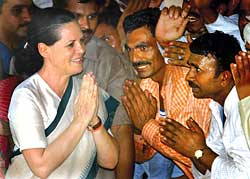 The world news agenda focuses-necessarily-on war and disaster, politics and big business. These are forces that creep into everyday lives and change them irreparably. So it is the job of the reporter to enquire into these matters and lay out what facts can be unearthed.
The world news agenda focuses-necessarily-on war and disaster, politics and big business. These are forces that creep into everyday lives and change them irreparably. So it is the job of the reporter to enquire into these matters and lay out what facts can be unearthed. Lately, a ray of light from South Asia shone into a litany of news that is otherwise dark and foreboding. And this was the general election in India. Now understand that I'm not declaring for Congress here. I take no sides in Indian politics, save to be against extremists of all sorts and to be in favour of democracy. That is what India showed the world, that is the light that emanated from Kashmir to Kanyakumari recently. Remember Chairman Mao Zedong saying, "the Chinese people have stood up" when he spoke to party cadres in Beijing after his successful revolution? Well to my mind, the Indian people not only stood up, they leapt to their feet, punched their fists into the air and made it very clear that they were mad as hell and not going to take it anymore. They did what works best in democracy-they punished a government with their votes. Not that Atal Behari Vajpayee's coalition government was particularly bad or inept. It wasn't. Vajpayee himself is a towering figure in Indian public life. Some of his cabinet colleagues were able and well meaning. A few interesting policies were in the works, not least privatising some of India's vast public sector so that money used to run government steel mills could be spent in villages and farm communities. But the Indian electorate wasn't impressed, and it let that be known in the most convincing way possible.
So now over to Congress and its ragbag of allies across the political spectrum. Except for the communist parties, the new coalition in India isn't that different from the old one. There are regional parties from the south where personalities count more than policy. There are disgruntled independents, those who want to carve new states from old, one-issue parties, regional satraps and political gadflies. Prime Minister Manmohan Singh, a dignified and honest man, has quite a task holding them all together. At the heart of this democratic turmoil is an organisation that is a political party in name only-the Indian National Congress. Aside from using the word 'secular', it's hard to find a term to sum up Congress from a political point of view. It's more of a political system unto itself, led by a dynasty, its ranks stuffed with opportunists and sincere reformers alike. The Congress is a uniquely south Asian organisation, and its renewal at the polls last month is good news for Indian democracy, even if the leader inherited her job.
The democratic system works best with a vigourous responsible oppostition to keep the government in check, along with a lively, committed media. India has both. It was always said of the BJP that were more comfortable opposing than proposing. They proved that maxim wrong in power, but they didn't cover all of the bases necessary for re-election so they paid the ultimate price. For now.
Indian democracy is alive and well. It's a journalists' delight and something the Indian people are rightly proud of. Despite corruption, confusion and cronyism galore, India uses the ballot to change governments-not royal fiat or military coup. Nepal's putative power brokers take note and repeat after me: Democracy Now. It's the only system that works.



